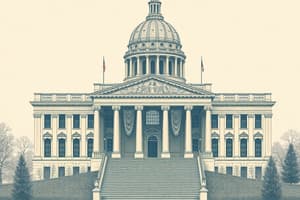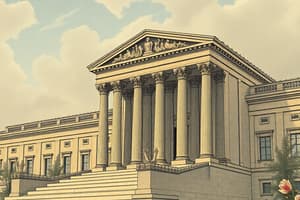Podcast
Questions and Answers
What power does Sec. 8 Clause 1 give to Congress?
What power does Sec. 8 Clause 1 give to Congress?
- To collect taxes (correct)
- To borrow money
- To punish pirates
- To regulate commerce
What does Sec. 8 Clause 2 allow Congress to do?
What does Sec. 8 Clause 2 allow Congress to do?
To borrow money on the credit of the United States
What is the purpose of Sec. 8 Clause 3?
What is the purpose of Sec. 8 Clause 3?
To regulate commerce with foreign nations and among the states
What is established under Sec. 8 Clause 4?
What is established under Sec. 8 Clause 4?
Which of the following is controlled by Congress according to Sec. 8 Clause 5?
Which of the following is controlled by Congress according to Sec. 8 Clause 5?
Sec. 8 Clause 6 provides for the punishment of counterfeiting currency.
Sec. 8 Clause 6 provides for the punishment of counterfeiting currency.
What power is given to Congress by Sec. 8 Clause 7?
What power is given to Congress by Sec. 8 Clause 7?
What does Sec. 8 Clause 8 promote?
What does Sec. 8 Clause 8 promote?
What authority does Sec. 8 Clause 9 grant to Congress?
What authority does Sec. 8 Clause 9 grant to Congress?
What jurisdiction does Sec. 8 Clause 10 provide to Congress?
What jurisdiction does Sec. 8 Clause 10 provide to Congress?
Flashcards are hidden until you start studying
Study Notes
Powers of Congress - Section 8 Overview
- Clause 1: Grants Congress the authority to levy taxes for debt repayment and the general welfare. It mandates uniformity in duties and tariffs across all states.
- Clause 2: Allows Congress to borrow money on behalf of the U.S., giving it the capacity for deficit spending to finance government programs, particularly evident in recent decades.
- Clause 3: Empowers Congress to regulate commerce both internationally and between states, with judicial interpretations evolving from narrow to broad, affecting various economic activities.
- Clause 4: Authorizes Congress to create a naturalization process for immigrants and establish bankruptcy laws, highlighting America's identity as a nation of immigrants and allowing for structured debt relief.
- Clause 5: Empowers Congress to mint currency and theoretically regulate its value, though practical control has shifted to the Federal Reserve since its establishment in 1913. Also covers the establishment of weights and measures.
- Clause 6: Provides Congress with the power to penalize counterfeiting of currency and securities, serving as a safeguard against financial fraud.
- Clause 7: Empowers Congress to establish post offices and related transportation infrastructure, historically marking the post office as a significant federal entity.
- Clause 8: Grants Congress the ability to create copyright and patent systems to protect the rights of authors and inventors, fostering innovation and creativity.
- Clause 9: Authorizes Congress to establish lower federal courts under the Supreme Court, leading to a comprehensive judicial system with multiple levels of courts.
- Clause 10: Confers power to Congress to define and enforce laws against piracy and violations of international law, reflecting its responsibility in maintaining maritime order.
Studying That Suits You
Use AI to generate personalized quizzes and flashcards to suit your learning preferences.




